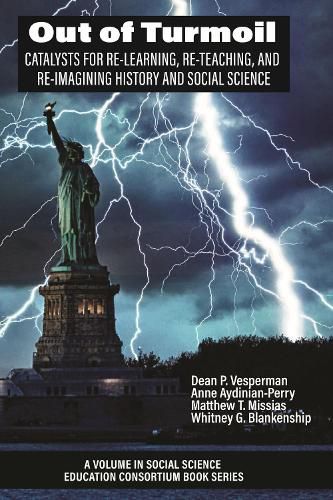Readings Newsletter
Become a Readings Member to make your shopping experience even easier.
Sign in or sign up for free!
You’re not far away from qualifying for FREE standard shipping within Australia
You’ve qualified for FREE standard shipping within Australia
The cart is loading…






This title is printed to order. This book may have been self-published. If so, we cannot guarantee the quality of the content. In the main most books will have gone through the editing process however some may not. We therefore suggest that you be aware of this before ordering this book. If in doubt check either the author or publisher’s details as we are unable to accept any returns unless they are faulty. Please contact us if you have any questions.
It is not difficult to argue that the social sciences are in a period of transition. Our day-to-day lives have been marked by uncertainty as our social lives have vacillated wildly between highs and lows, tensions between fellow citizens have heightened along ideological fault lines, and educators have been placed squarely at the center of public discourses about what-and how-we should be teaching. By any measure, we are living in a time where every moment seems to be rife with high stakes realities that must be navigated.
Ladson-Billings (2020) called on educators to reimagine education and contest the notion of a "return to normal." In the current highly polarized context where we see multiple competing narratives, rather than promoting a "return to normal" or "business as usual" approach, we argue that educators must use the lessons of the last two years, as well as draw on what we have learned from history and the social sciences. By asking ourselves how we might interrogate and inform current social landscapes and the challenges that arise from them, we have the opportunity to take leadership in fostering innovation, building solidarity, and re-imagining the teaching and learning of history and the social sciences.
We recognize that humans live in multiple complex communities that include intersectional identities; relationships with power, agency, and discourses; and lived realities that are as unique as they are divergent. Consequently, the task of educators, and the goal of this volume, is to provide a clarion voice to a dynamic, relational, and undeniably human social world.
$9.00 standard shipping within Australia
FREE standard shipping within Australia for orders over $100.00
Express & International shipping calculated at checkout
This title is printed to order. This book may have been self-published. If so, we cannot guarantee the quality of the content. In the main most books will have gone through the editing process however some may not. We therefore suggest that you be aware of this before ordering this book. If in doubt check either the author or publisher’s details as we are unable to accept any returns unless they are faulty. Please contact us if you have any questions.
It is not difficult to argue that the social sciences are in a period of transition. Our day-to-day lives have been marked by uncertainty as our social lives have vacillated wildly between highs and lows, tensions between fellow citizens have heightened along ideological fault lines, and educators have been placed squarely at the center of public discourses about what-and how-we should be teaching. By any measure, we are living in a time where every moment seems to be rife with high stakes realities that must be navigated.
Ladson-Billings (2020) called on educators to reimagine education and contest the notion of a "return to normal." In the current highly polarized context where we see multiple competing narratives, rather than promoting a "return to normal" or "business as usual" approach, we argue that educators must use the lessons of the last two years, as well as draw on what we have learned from history and the social sciences. By asking ourselves how we might interrogate and inform current social landscapes and the challenges that arise from them, we have the opportunity to take leadership in fostering innovation, building solidarity, and re-imagining the teaching and learning of history and the social sciences.
We recognize that humans live in multiple complex communities that include intersectional identities; relationships with power, agency, and discourses; and lived realities that are as unique as they are divergent. Consequently, the task of educators, and the goal of this volume, is to provide a clarion voice to a dynamic, relational, and undeniably human social world.